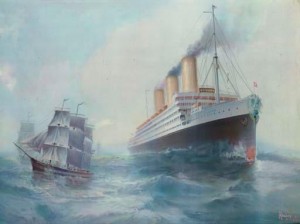In the bar, S. presses Sola for logistical details regarding his identity and whereabouts, while Sola steers the conversation to flirtatious waters. The tension in the dialogue results from the mystery of both of their identities. S. wants to figure out who he is, but Sola teases him: “you’re making a sport of me. What’s your game?”
Two significant names appear on this page: The Imperia and The Archer’s Tale (See 20A). Sola tells S. she came to town on The Imperia. The page mentions nothing else about the ship. It is unclear to what extent The Imperia refers to something in real life. There doesn’t seem to be a ship with the name, but a significant statue in Germany (the subject of a story by Balzac) and a costal town in Italy share the name. At the very least, European historical and cultural features inspired The Imperia. The ship is also mentioned in the insert 20A.

Due to the ambiguity of when the story took pace, The Imperia could have been a pre-industrial ship (left) or a steamship (right).
Durst forces the connection between S. and Sola. The dialogue between the two does not have much substance, as neither character speaks in specifics. Therefore, the only two proper nouns on the page (The Imperia and The Archer’s Tale) deserve extra attention.
Jen and Eric however, converse much more naturally over the course of two important exchanges. The first concerns The Archer’s Tale. After confidently asserting that no such book exists, Eric is disproven by Jen’s research finesse. She inserts an article detailing the history of the book (history that’s true in their world). Admitting his exposed arrogance, Eric appropriately writes, “WOW” in response before jumping into the implications of Jen’s research — chiefly, why does Straka chose a real book, when he invariably makes up book titles, and how does he know about The Archer’s Tale?
In this exchange Eric learns that research is not a solitary endeavor. Thus far in his life, Eric believed in taking matters into his own hands. While Eric must have originally pictured Jen as an assistant or sidekick, on this page, she challenges that notion. Thanks to her abilities, Jen — who starts helping Eric as an escape from the world she does not fit into —becomes encouraged by the fact she proved Eric, a pretentious graduate student, wrong.
In the next exchange, Jen and Eric reveal personal and biographical details, with a hint of romance. Throughout the book, Jen segues from a sentence in SOT to a similar experience in her life. She says she won a prize to study in Paris but turned it down. Eric presses her for more details, and she explains she feared “doing something different” and felt “like I had too much going on here.” The latter reason recalls the fact that her parents and friends play a constricting role in her life. Eric expresses his regret that she had a great opportunity at the wrong time to which Jen responds “I was hoping you would say something uplifting.” This line characterizes Jen as rude and sassy. Eric decides to create a moment of vulnerability, “That’s not really what I’m good at.”



You must be logged in to post a comment.